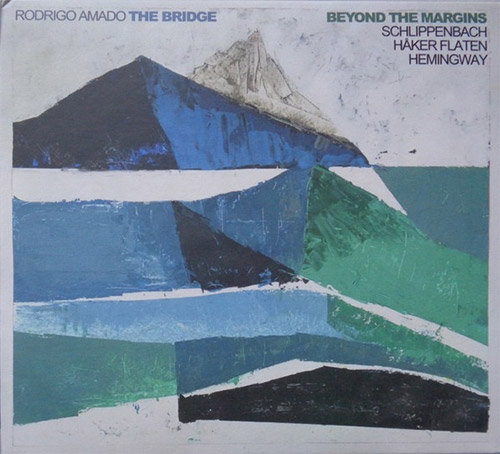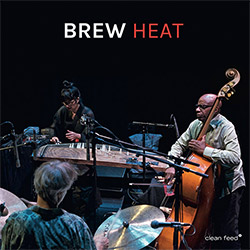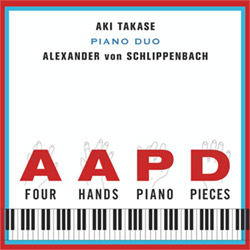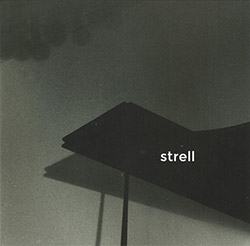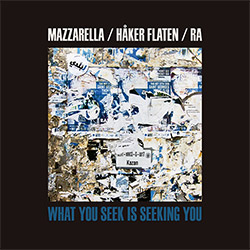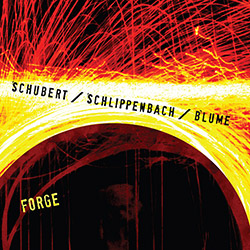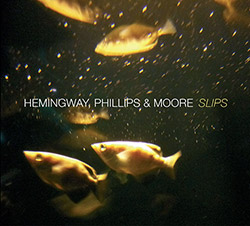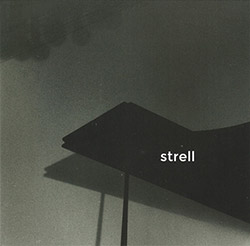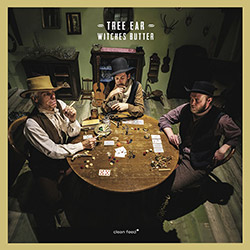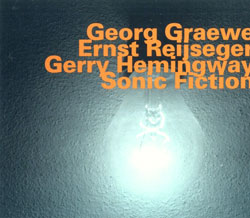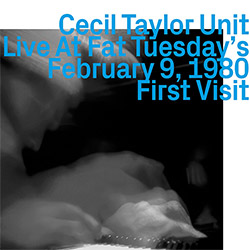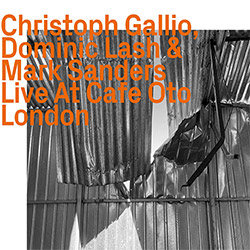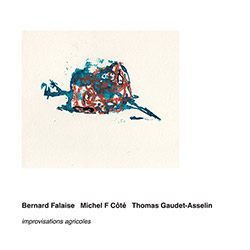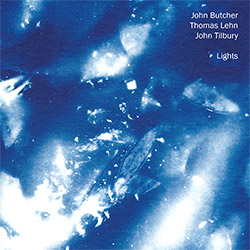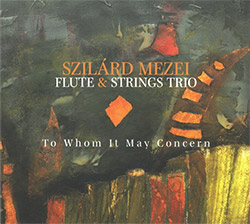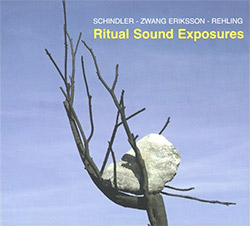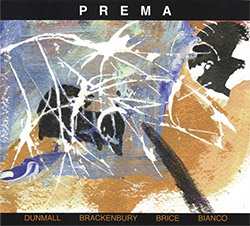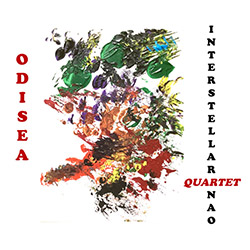
Assembled by Portuguese saxophonist Rodrigo Amado, this stellar quartet bridges nations with German pianist Alexander von Schlippenbach, Norwegian double bass player Ingebrigt Haker-Flaten, and American drummer Gerry Hemingway, presenting the extended, masterful collective title track, along with two shorter works, particularly revisiting Albert Ayler's "Ghosts".
Out of Stock
Quantity in Basket: None
Log In to use our Wish List
Shipping Weight: 3.00 units
Sample The Album:
Rodrigo Amado-tenor saxophone
Alexander von Schlippenbach-piano
Ingebrigt Haker Flaten-double bass
Gerry Hemingway-drums
Click an artist name above to see in-stock items for that artist.
UPC: 9120036683860
Label: Trost Records
Catalog ID: TROST 240CD
Squidco Product Code: 34097
Format: CD
Condition: New
Released: 2023
Country: Austria
Packaging: Cardboard Gatefold
Recorded at Pardon To Tu, in Warsaw, Poland, on October 3rd, 2022, by Bartosz Szkielkowski.
"In this quartet, Amado gathers three of his strongest longtime influences: German pianist Alexander von Schlippenbach, Norwegian double bass player Ingebrigt Haker-Flaten, and American drummer Gerry Hemingway. For Amado this band represents a deep dive into his own formative roots, something he has been dealing with more and more in these last few years. With Schlippenbach, Haker-Flaten, and Hemingway by his side, Amado has the perfect context to explore the classic materials he considers to be the basis of his journey as a musician, an impulse that is part him and part history. This is a quartet whose name really represents, aside from a direct homage to Sonny Rollins, a bridge between different languages, backgrounds and generations, all united through improvisation."-Trost
"Rodrigo Amado has been putting together international bands for some 20 years, beginning with the shifting personnel of the Lisbon Improvisation Players and his early sessions as a leader, ad hoc assemblies of local musicians (e.g., Acácio Salero, Bruno Pedroso, Ulrich Mitzlaff and Carlos Zingaro) and American visitors (e.g., Ken Filiano, Steve Adams and Dennis Gonzalez). Early on, he put together a trio with Kent Kessler and Paal Nilssen-Love and then a quartet with Taylor Ho Bynum, John Hébert and Gerald Cleaver.
Through the 2010s Amado developed both his Lisboan Motion Trio with drummer Gabriel Ferrandini and cellist Miguel Mira, a group that has played and recorded with guests Jeb Bishop, Alexander Schlippenbach and Peter Evans, and the quartet that came to be known as This Is Our Language, with Joe McPhee, Kessler and Chris Corsano. The Bridge, playing together for the past year, is a new international assembly with Schlippenbach, drummer Gerry Hemingway and bassist Ingebrigt HĆker Flaten, a special combination of talents and experience, not least for their leadership of, or membership in, bands with stellar saxophonists. One associates Schlippenbach with his own fifty-year leadership of a trio with Evan Parker, Hemingway with membership in Anthony Braxton’s most celebrated ensemble and HĆker Flaten with Scandinavia’s ultimate power trio, The Thing with Mats Gustafsson. Hemingway and HĆker Flaten have employed two of the world’s most under-recognized tenor saxophonists in their own groups, Ellery Eskelin and Dave Rempis, respectively.
More than mere expectation, there’s an air of excitement about the group, though its members go about their business with an involvement in the developing music so acute that it resembles a kind of omni-directional, omni-temporal relaxation and tension at once, in which the relaxation/ tension of great achievement accompanies the realization of the event.
The principal work here is the forty-minute “Beyond the Margins”, an extended free improvisation in which every musician is completely engaged in the evolution of a collective creation, each coming to the fore in the on-going dialogue to assume the lead or solo. It’s a kind of ideal conversation while simultaneously a collectively and continuously shaped creation, the substance of the time of its making. Different degrees of known and unknown content will arise, different degrees of formal marking, but at its best, such collective creation cannot be disputed or divided up, each stellar individual contribution conditioned by collective support and response, with Amado achieving levels of articulate intensity that may not have occurred on previous recordings. It’s essentially a trance, trance as transport and journey, its revelations signalled from the pensive grandeur of its opening through all its dimensions, including its abstract fluting, torrential knottings (perhaps matched elsewhere but not exceeded) and sudden liberations.
That epic improvisation is complemented by two brief but deeply traditioned pieces. The brief “Personal Mountains” is, if possible, perfect “free Monk”, tightly structured from the outset by Schlippenbach, Monk’s most thorough devotee, the melody and form picked up by Amado, Hemingway and HĆker Flaten, the architecture executed flawlessly, as if it were how they regularly spent their time.
The performance of Albert Ayler’s “Ghosts” calls for a special note. A while ago, a performance video of Amado was circulating in which he played “Ghosts” with a student rhythm section and trumpeter Peter Evans at a workshop in the Azores. It was, as is this, extraordinary, both in its sound and its magisterial presence. On a personal note, once on a solitary midnight walk during a brief visit to Montreal in 1967, I went in search of The Barrel, perhaps the only place in Canada that regularly featured significant free jazz figures. In one of youth’s enchanted moments, my favorite musician in the world just happened to be playing there. Albert Ayler’s sound was blossoming out of the open door, expanding into the August night. I’ve never heard a saxophone sound as full or as complex, never quite caught on record, a broad sound that could begin in foghorn lower-register blast and trail off into upper partials as sweet, gauze-like and airy as those of Stan Getz.
There’s been a sudden flurry of Ayler derivatives in free jazz lately, generally a trivialization, a kind of devout mockery, of one of the greatest figures in the music’s history by some of the least skillful. There’s none of that here—instead that melody, initiated in a whisper, soars as authentic tribute and visionary invocation on Amado’s own rich, complex, precise and distinct timbres, inflections and emotions, each note, each sound as if weighed on an alchemist’s scale. As elsewhere, the group is superb."-Stuart Broomer, The Free Jazz Collective
Get additional information at The Free Jazz Collective
Artist Biographies
• Show Bio for Rodrigo Amado "Portuguese saxophonist (alto, C melody, baritone, and tenor) Rodrigo Amado specializes in free-form, composition-in-the-moment jazz, and his various projects and trios have given him an international following. Born in Lisbon in 1964, Amado began studying the sax at the age of 17, briefly at the Hot Club Music School of Lisbon and with mentors Carlos Martins, Pedro Madaleno, and Jorge Reis, among other leading Portuguese jazz artists. With diverse musical interests, he explored how improvisation is handled in other genres, although his work with his various ensembles like the Lisbon Improvisation Players and the Motion Trio (with Miguel Mira and Gabriel Ferrandini) falls clearly under the umbrella of 21st century jazz, and he has been an in-demand studio player on numerous recorded projects. He started his own label, Clean Feed, in 2001, with brothers Pedro and Carlos Costa, before leaving the imprint in 2005 to start a second label, European Echoes. Also an accomplished professional photographer, Amado continues to be a bright light on the Portuguese and international improvisational jazz scene." ^ Hide Bio for Rodrigo Amado • Show Bio for Alexander von Schlippenbach "One of Europe's premier free jazz bandleaders, pianist Alexander von Schlippenbach's music mixes free and contemporary classical elements, with his slashing solos often the link between the two in his compositions. Schlippenbach formed The Globe Unity Orchestra in 1966 to perform the piece"Globe Unity, which had been commissioned by the Berliner Jazztage. He remained involved with the orchestra into the '80s. Schlippenbach began taking lessons at eight, and studied at the Staatliche Hochschule for Musik in Cologne with composers Bernd Alois Zimmermann and Rudolf Petzold. He played with Gunther Hampel in 1963, and was in Manfred Schoof's quintet from 1964 to 1967.Schlippenbach began heading various bands after 1967, among them 1970 trio with Evan Parker and Paul Lovens and a duo with Sven-Ake Johansson which they co-formed in 1976. Schlippenbach has also given many solos performances. In the late '80s, he formed the Berlin Contemporary Jazz Orchestra,which has featured a number ofesteemed European avant-garde jazz musicians including Evan Parker, Paul Lovens, KennyWheeler, Misha Mengelberg and Aki Takase. During the 90`s Duo work with Tony Oxley, Sam Rivers and Aki Takase. 1999 started performance and radiorecording of Thelonius Monks complete works, (all the compositions) with Rudi Mahall and his group "Die Enttäuschung"." ^ Hide Bio for Alexander von Schlippenbach • Show Bio for Ingebrigt Haker Flaten "Ingebrigt Håker Flaten (b. 1971, Oppdal) - studied Jazz at the Music Consevatory in Trondheim, Norway (1992-1995) under the tutelage of bassplayer Odd Magne Gridseth. When one listens to the great bassists in modern jazz history, a striking thing (though it may not be immediately arrived at) is that greatness is reached through open-mindedness and diversity. William Parker, Malachi Favors Maghostut, Peter Kowald, Wilbur Ware, Bertram Turetsky, Buell Neidlinger - all of these bass players have embraced a lifestyle of playing all sorts of music and the breadth of each musicians' technique is a testament to those experiences. Norwegian bassist and composer Ingebrigt Håker Flaten is also a musician whose experience is both geographical and aesthetic. While the fertile Scandinavian new jazz scene offered a vast amount of opportunities to work in different bands with musicians whose concepts are as individual as the grains in a reed, Flaten has found home and on-the-bandstand education in places as far flung as Chicago and his current residence Austin, Texas. A muscular player whose tone and attack run the gamut from Paul Chambers to Buschi Niebergall, his sense of both openness and control serves ensembles as diverse as The Thing, Free Fall, Atomic, Scorch Trio and the Kornstad/Håker Flaten Duo. In addition to his own Chicago Sextet and Austin-centric Young Mothers, Flaten has also recorded and performed with Frode Gjerstad, Dave Rempis, Bobby Bradford, the AALY Trio, Ken Vandermark, Stephen Gauci, Tony Malaby, Daniel Levin, Dennis Gonzalez and numerous others. Flaten studied at the Conservatory in Trondheim (1992-1995), turning professional shortly afterward, yet his hunger to play in new situations with new musicians - schooled or amateur, frequently recorded or just starting out - puts him in a rare class, that of a truly broad-minded artist. That mettle has served him well, living and developing the music under his own steam and drawing from influences as diverse as Derek Bailey, George Russell, Chris McGregor, filmmakers Ingmar Bergman, contemporary pop melody and gritty punk music as well as everyday sights and sounds. There is a calmness and self-assuredness that imbues all great artists, in that the diversity of their work comes with very little ego. Flaten's artistry is often in collective, leaderless ensembles and in fact, following a decade of professional musicianship it wasn't until 2004 that his leader-debut was released - Quintet (Jazzland, followed in 2008 by The Year of the Boar, and a Sextet recording is upcoming). This latter fact is partly due to the necessity of a copacetic situation - in an interview in 2010 with the Austinist he noted that "I use people where I'm located. It's inspiring to have your own band to write for, but you have to make sure that people feel free and not limited by the music; the compositions should lead the way to a player's open mind, and that is a challenge." Certainly not every bandleader/composer thinks this way. In 2011, he formed another ensemble, The Young Mothers, which includes drummers Stefan Gonzalez (Dallas) and Frank Rosaly (Chicago), trumpeter/poet/rapper Jawaad Taylor (New York), saxophonist Jason Jackson (Houston), and Jonathan Horne (Austin) on guitar. It's a group of varying levels and influences and as it grows organically, will be another excellent lens through which to view Flaten's aesthetic, philosophy, and musicianship. The next few years see him in a position where established ensembles can steep and spread their influence, while experimenting with and nurturing a wide range of new relationships." ^ Hide Bio for Ingebrigt Haker Flaten • Show Bio for Gerry Hemingway "Gerry Hemingway has led a number of quartet and quintets since the mid 1980's. In addition he has been a member of a wide array of long standing collaborative groups including Brew with Reggie Workman and Miya Masaoka, the GRH trio with Georg Graewe and Ernst Reijseger, the WHO trio with Michel Wintsch and Bänz Oester, as well as numerous duo projects with Thomas Lehn, John Butcher, Ellery Eskelin, Marilyn Crispell, and others. Mr. Hemingway is a Guggenheim fellow and has received numerous commissions for chamber and orchestral works as well as being noted for his innovative and multifaceted work as a solo performer which began in 1974. He was a member of the Anthony Braxton Quartet between 1983 and 1994 and is also well known for his collaborations with some of the world's most outstanding improvisers and composers including Evan Parker, Cecil Taylor, Mark Dresser, Anthony Davis, Derek Bailey, Leo Smith and many others. He currently lives in Switzerland having joined the faculty of the Hochschule Luzern in 2009." ^ Hide Bio for Gerry Hemingway
7/10/2024
Have a better biography or biography source? Please Contact Us so that we can update this biography.
7/10/2024
Have a better biography or biography source? Please Contact Us so that we can update this biography.
7/10/2024
Have a better biography or biography source? Please Contact Us so that we can update this biography.
7/10/2024
Have a better biography or biography source? Please Contact Us so that we can update this biography.
Track Listing:
1. Beyond the Margins (40:30)
2. Personal Mountains (7:41)
3. (Visiting) Ghosts (7:47)
Improvised Music
Jazz
Free Improvisation
Collective Free Improvsation
European Improvisation, Composition and Experimental Forms
Trio Recordings
Schlippenbach
Staff Picks & Recommended Items
New in Improvised Music
Recent Releases and Best Sellers
Search for other titles on the label:
Trost Records.


